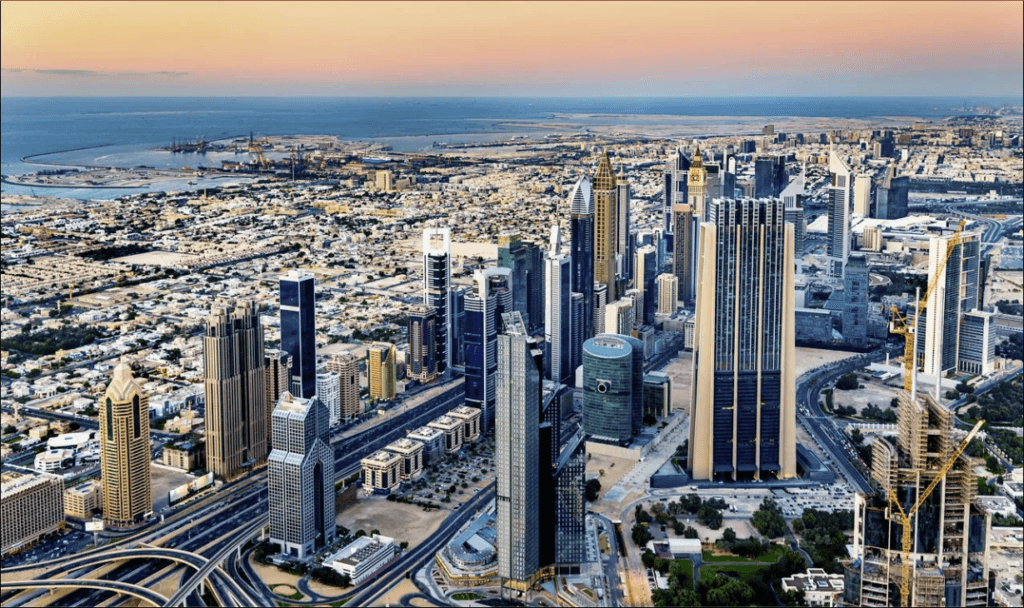How to Buy Commercial Property in Dubai – Dubai has long been a global hub for business, investment, and tourism, attracting entrepreneurs and investors from around the world. Its strategic location, tax-free environment, and world-class infrastructure make it a desirable destination for commercial property investment. Whether you’re looking to expand your business or diversify your investment portfolio, purchasing commercial property in Dubai offers numerous benefits.
In this comprehensive guide, we will cover the essential steps, legal considerations, and strategies you need to know when buying commercial property in Dubai.
Table of Contents – How to Buy Commercial Property in Dubai ?
- Why Invest in Commercial Property in Dubai?
- Types of Commercial Properties in Dubai
- Legal Framework for Buying Commercial Property
- Freehold vs Leasehold Properties
- Steps to Buy Commercial Property in Dubai
- Financing Options for Commercial Properties
- Key Areas to Invest in Dubai
- Costs Involved in Buying Commercial Property
- Understanding ROI and Yield in Commercial Investments
- Conclusion: Is Dubai the Right Place for Your Commercial Investment?

1. Why Invest in Commercial Property in Dubai?
Dubai’s rapid growth as a business and financial center has made it a top choice for property investment. Here are some of the key reasons why investing in commercial property in Dubai is advantageous:
- Tax-Free Income: Dubai offers a zero-tax policy on personal and corporate income, which means higher returns on your investment.
- Growing Economy: With its strategic location between Europe, Asia, and Africa, Dubai has become a hub for international trade and commerce, attracting businesses from all over the world.
- World-Class Infrastructure: Dubai is known for its cutting-edge infrastructure, including transportation systems, telecom networks, and free zones dedicated to specific industries.
- Political Stability: The UAE’s political stability and strong legal framework have created a safe and attractive investment environment.
- Diversified Economy: While Dubai is famous for its oil wealth, its economy has diversified into sectors like tourism, technology, real estate, and financial services, offering a variety of investment opportunities.
Benefits of Investing in Dubai
- Capital Appreciation: With the constant influx of expatriates and global corporations setting up shop in Dubai, commercial properties see strong capital appreciation.
- High Rental Yields: Depending on the location, commercial properties in Dubai can offer rental yields between 6-9%, which is higher than many global cities.
- Foreign Ownership: Foreign investors can buy freehold properties in designated areas, meaning full ownership rights.
2. Types of Commercial Properties in Dubai
Dubai’s commercial real estate market offers a variety of options for investors and businesses. Some of the common types of commercial properties include:
- Office Spaces: These range from small units suitable for start-ups to large corporate headquarters.
- Retail Spaces: Ideal for shops, cafes, and other retail businesses, often located in malls, shopping complexes, and prime street locations.
- Warehouses: Used for storage, manufacturing, and logistics, warehouses are often located in industrial zones or free zones.
- Hotels and Hospitality: Dubai’s booming tourism sector makes hotel and serviced apartment investments a lucrative option.
- Mixed-Use Properties: These developments combine residential, retail, and commercial spaces, making them a versatile investment.
- Land for Development: For investors looking to build their own projects, buying land is also a viable option.
Choosing the right type of commercial property depends on your business needs, investment goals, and market demand.
3. Legal Framework for Buying Commercial Property
Buying commercial property in Dubai is relatively straightforward but comes with some legal considerations that both local and foreign investors should be aware of. Here are the key regulations and laws governing commercial property transactions in Dubai:
- Dubai Land Department (DLD): All property transactions must be registered with the Dubai Land Department, which oversees the legal transfer of property ownership.
- Foreign Ownership Law: Foreign investors can only buy commercial property in designated freehold areas. These include popular locations like Downtown Dubai, Business Bay, Dubai Marina, and Jumeirah Lake Towers.
- RERA (Real Estate Regulatory Authority): RERA is a regulatory body that ensures transparency and protection for buyers in the real estate market. It oversees real estate transactions, including developer regulations and service charges.
It’s essential to work with a registered real estate agent and legal advisor to ensure compliance with Dubai’s property laws.
4. Freehold vs Leasehold Properties
When buying commercial property in Dubai, it’s important to understand the difference between freehold and leasehold ownership:
Freehold
- Full Ownership: Freehold properties allow investors full ownership of the property and the land it sits on.
- Foreign Ownership: Foreign investors are permitted to buy freehold properties in designated areas of Dubai.
- Long-Term Investment: Freehold properties provide a long-term investment with no ownership expiry, making them ideal for those looking to establish a lasting business presence or secure rental income.
Leasehold
- Fixed-Term Ownership: Leasehold properties are typically owned for a period of 99 years, after which the ownership reverts to the landowner.
- Cost-Effective: Leasehold properties are often more affordable than freehold, making them suitable for businesses or investors with a limited budget.
Choosing between freehold and leasehold depends on your investment strategy, business timeline, and financial goals.
5. Steps to Buy Commercial Property in Dubai
Here’s a step-by-step guide to buying commercial property in Dubai:
Step 1: Define Your Investment Goals
Before you start looking for commercial properties, it’s important to define your goals. Are you looking for rental income, capital appreciation, or a space for your business operations? Knowing your objectives will help you make informed decisions.
Step 2: Choose the Right Property Type
Once you know your investment goals, choose the type of commercial property that aligns with those goals. Whether it’s office space, retail, or an industrial unit, your choice will depend on the market demand and expected returns.
Step 3: Research Key Locations
Location is crucial when buying commercial property. Research popular areas in Dubai such as Business Bay, Downtown Dubai, or Dubai Marina for office and retail spaces, or Al Quoz and Dubai South for warehouses and industrial properties.
Step 4: Secure Financing (If Needed)
If you require financing, many banks in Dubai offer commercial property loans with competitive interest rates. You will need to meet specific eligibility criteria and provide the required documentation.
Step 5: Work with a Reputable Real Estate Agent
A registered real estate agent can guide you through the property selection, negotiation, and transaction process. Make sure the agent is registered with the Dubai Land Department to ensure transparency and compliance.
Step 6: Conduct Due Diligence
Before committing to a purchase, conduct thorough due diligence, including verifying property ownership, checking for any existing mortgages, and reviewing service charges or other fees.
Step 7: Make an Offer and Sign the Contract
Once you’ve found the right property, make an offer. After agreeing on a price, a Memorandum of Understanding (MOU) will be signed between you and the seller, outlining the terms and conditions of the sale.
Step 8: Transfer of Ownership
The final step is the transfer of ownership at the Dubai Land Department. Both the buyer and seller will need to be present, and the property transfer fee (typically 4% of the property value) must be paid.
6. Financing Options for Commercial Properties
Financing options for commercial properties in Dubai include:
- Bank Loans: Many banks in Dubai offer commercial property loans, usually requiring a 25-30% down payment.
- Private Funding: Investors can also explore private funding or venture capital options, particularly for large-scale projects.
- Developer Financing: Some developers offer in-house financing schemes, which can be an attractive option for investors looking to reduce upfront costs.
Before applying for financing, ensure that you meet the eligibility criteria and have a clear business plan in place.
7. Key Areas to Invest in Dubai
Dubai offers numerous prime locations for commercial property investment. Here are some of the top areas to consider:
- Business Bay: Known as the business capital of Dubai, Business Bay is ideal for offices and corporate headquarters.
- Downtown Dubai: A prestigious location offering luxury retail spaces, offices, and mixed-use properties.
- Jumeirah Lake Towers (JLT): A free zone popular with international businesses, JLT offers a variety of commercial and residential properties.
- Dubai Marina: Known for its high-end retail and dining spaces, Dubai Marina is a prime location for businesses in the hospitality and tourism sectors.
- Al Quoz: An industrial hub, Al Quoz is perfect for warehouses and factories.
8. Costs Involved in Buying Commercial Property
When buying commercial property in Dubai, investors should consider the following costs:
- Property Price: The actual cost of the property, which will vary based on location, type, and size.
- Transfer Fee: A 4% property transfer fee is payable to the Dubai Land Department.
- Agency Fees: Real estate agents typically charge a 2% commission on the sale.
- Service Charges: Annual maintenance and service charges vary depending on the property type and location.
Make sure to budget for these additional costs when planning your investment.
9. Understanding ROI and Yield in Commercial Investments
Return on Investment (ROI) and rental yield are critical factors when evaluating commercial property in Dubai. Here’s how to calculate them:
– ROI: This is calculated as (Net Profit / Total Investment) x 100. A good commercial property in Dubai typically offers an ROI of 6-9%.
Yield: This is the annual rental income as a percentage of the property’s value. For example, a property generating AED 200,000 in annual rent on a AED 3 million property has a yield of 6.67%.
It’s important to factor in maintenance costs, vacancy rates, and market conditions when calculating your expected ROI and yield.
10. Conclusion: Is Dubai the Right Place for Your Commercial Investment?
Dubai’s commercial property market continues to be one of the most attractive investment opportunities in the region, offering high returns, a tax-free environment, and a stable economy. Whether you’re looking to establish a business, generate rental income, or diversify your portfolio, Dubai’s commercial real estate sector offers something for every investor.
Investing in commercial property in Dubai requires careful planning, research, and legal due diligence, but the rewards can be significant. For more insights and global property investment strategies, visit Forbes Real Estate.
FAQs
Q1: Can foreigners buy commercial property in Dubai?
A1: Yes, foreigners can buy freehold commercial property in designated areas.
Q2: What is the average rental yield for commercial properties in Dubai?
A2: The average rental yield for commercial properties in Dubai ranges from 6% to 9%, depending on location and property type.
Q3: Is there a tax on commercial property in Dubai?
A3: Dubai does not impose any taxes on income from commercial properties, making it an attractive destination for investors.





